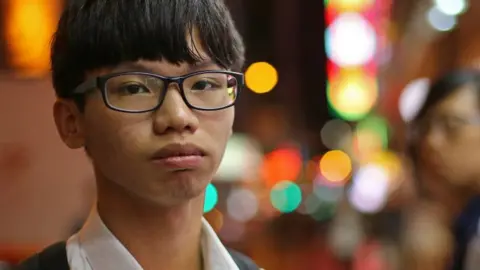Hong Kong security law: Four students arrested for 'inciting secession'
 Getty Images
Getty ImagesFour students have been arrested in Hong Kong in the first police operation to enforce China's new national security law for the territory.
The four were detained for "inciting secession" on social media after the new law began on 1 July, police said.
A pro-independence group said those arrested included its former leader, Tony Chung.
Beijing's controversial new law criminalises subversion, secession and collusion with foreign forces.
Previous arrests under the new law have been made for slogans and banners at protests.
Critics say China's new law erodes Hong Kong's freedoms. But Beijing has dismissed the criticism, saying that the law is necessary to stop the type of pro-democracy protests seen in Hong Kong during much of 2019.
What do we know about the arrests?
Three men and a woman aged between 16 and 21 were arrested on suspicion of organising and inciting secession, police said.
"Our sources and investigation show that the group recently announced on social media to set up [sic] an organisation that advocates Hong Kong independence," said Li Kwai-wah from the new national security unit inside Hong Kong police.
Computers, phones and documents were also seized, he said.
The students were former members of or had links to Studentlocalism, a pro-independence youth group. It was disbanded in June before the new security law came into force and said it would continue to campaign from abroad.
But Mr Li said overseas activity could still be prosecuted.
"If anyone who tells others that he advocates violating the national security law from abroad, even he does that from overseas, we have the jurisdiction to investigate these kind of cases," he said.
Photos posted on social media showed Mr Chung being led away in handcuffs in the district of Yuen Long.
Studentlocalism said Mr Chung was detained at about 20:50 local time (12:50 GMT). Police officers also took away items in several bags, the group said.
Prominent rights activist Joshua Wong said Mr Chung had been followed by police for several days. He said Mr Chung had been arrested for writing a Facebook post on "China's nationalism" and alleged that the detainees' phones had been hacked shortly after their arrest.
"Tonight's arrest will clearly send a chilling effect on HK online speech," Mr Wong tweeted.

What is the new security law?
- It is wide-ranging, making inciting hatred of China's central government and Hong Kong's regional government illegal
- Allows for closed-door trials, wire-tapping of suspects and the potential for suspects to be tried on the mainland
- A wide range of acts, including damaging public transport facilities, can be considered terrorism
- Internet providers might have to hand over data if requested by police

What has been the reaction to the law?
Authorities in both Hong Kong and mainland China insist the security law will not affect freedom of speech and is needed to quell successive waves of unrest in the city.
But critics say it undermines the freedoms that set Hong Kong apart from the rest of China and helped define its character.
The UK, Canada, Australia and New Zealand have all suspended extradition treaties with Hong Kong since the new law was enacted. Meanwhile the US has decided to rescind Hong Kong's special trading privileges.
In recent years, Hong Kong has seen a series of protests demanding more rights. In 2019, rallies over a now-scrapped bill permitting extraditions to the mainland turned violent and fuelled a broad pro-democracy movement.
